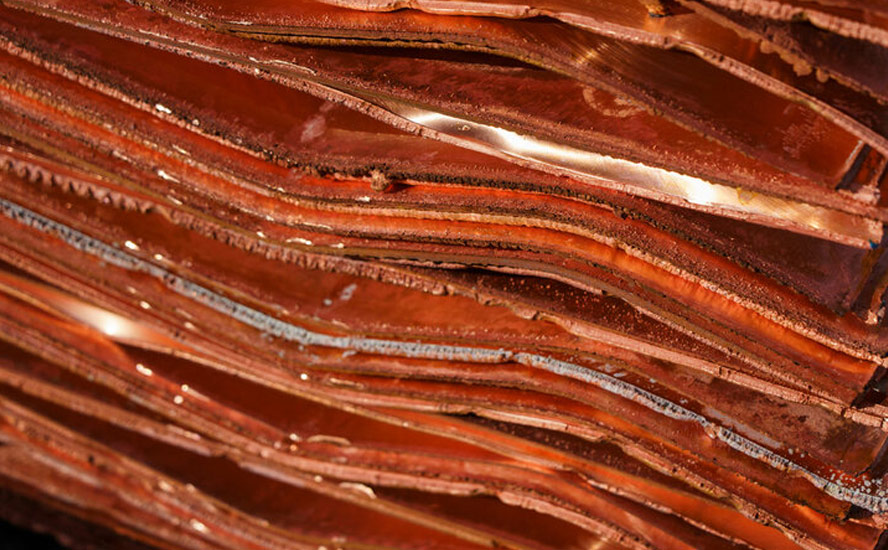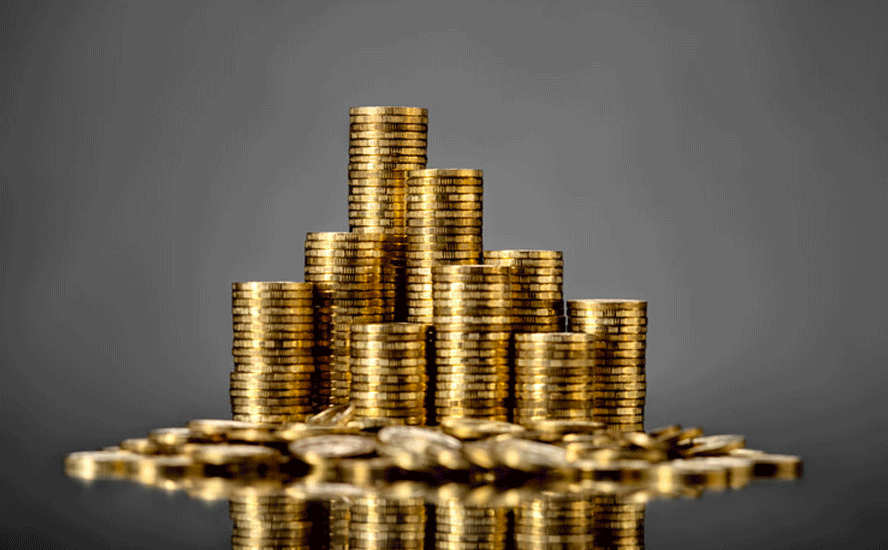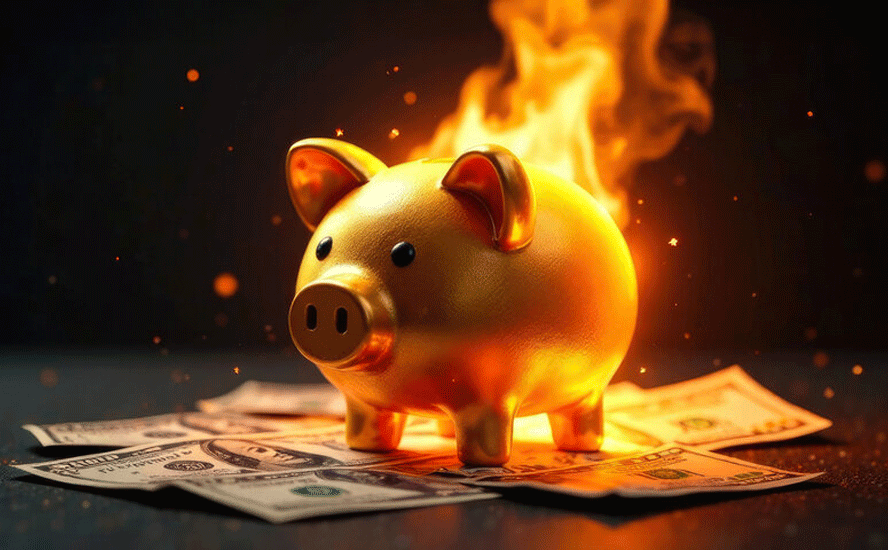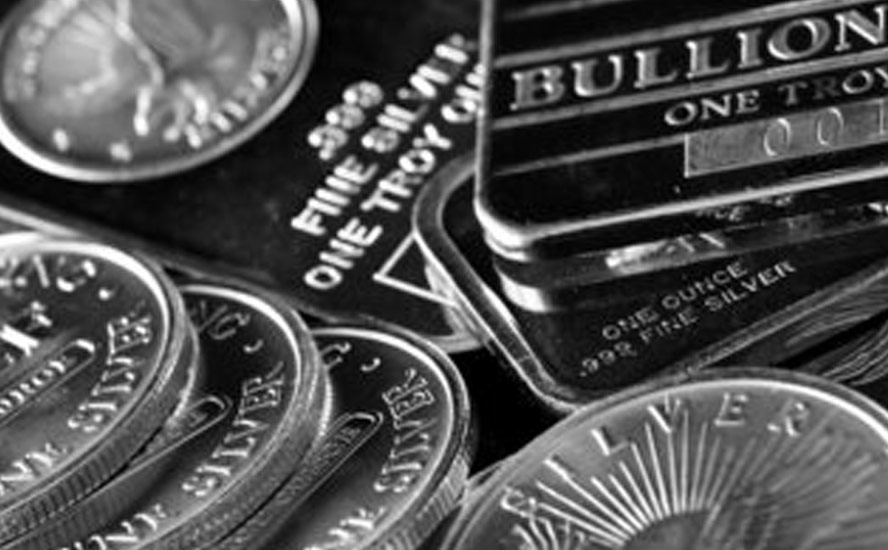Gold Will Reflect Inflation
By Adam Hamilton
2022.12.30
Gold largely ignored inflation raging out of control in 2022. Despite the first inflation super-spike since the 1970s, history’s ultimate inflation hedge disappointed. But that unsustainable anomaly driven by extreme Fed rate hikes catapulting the US dollar parabolic won’t last. Inevitably prevailing gold prices will adjust much higher to reflect this red-hot inflation fueled by epic money-supply growth. That’s very bullish for 2023.
During this past year, the primary US inflation gauge recorded extremes not seen in four decades. The monthly headline Consumer Price Index averaged blistering 8.1% year-over-year surges, never printing lower than 7.1%. June 2022’s staggering 9.1% peak proved the hottest CPI since way back in November 1981, fully 40.6 years earlier! And the CPI has been heavily watered down since, lowballed for political reasons.
Such serious inflation should’ve lit a fire under gold, fueling massive investment demand. Gold got off to a strong start in 2022, surging up 12.1% year-to-date in early March. But that was a geopolitical spike on Russia invading Ukraine, which wasn’t sustainable. From there gold collapsed 20.9% over the next 6.6 months into late September. That left it down a shocking 11.3% YTD in the worst inflation year since 1981!
That gaping gold-inflation disconnect made no sense, leaving investors increasingly bearish. But gold’s brutal mid-2022 plunge was an extreme anomaly driven by the Fed scrambling to stuff that inflation genie back in the bottle. Between mid-March to early November, the Federal Open Market Committee hiked its federal-funds rate an astounding 375 basis points. That included a shocking streak of four monster 75bp hikes!
As those frantic rate hikes accelerated, the benchmark US Dollar Index skyrocketed up 14.3% between mid-April to late September to hit a stunning 20.4-year secular high. That unleashed enormous gold-futures selling, slamming gold 17.9% lower in that span. That accounted for 6/7ths of its mid-year plunge, and had nothing to do with inflation. But it exhausted gold-futures speculators’ capital firepower for selling.
So gold bounced strongly since, powering up as much as 12.1% into late December despite another big 50bp Fed rate hike! With major gold-futures mean-reversion buying underway, that selloff anomaly has passed. That clears the way for gold to start reflecting this raging inflation. Ironically that wasn’t spawned by the Fed’s zero-interest-rate policy after the pandemic-lockdown stock panic, but the Fed’s epic money printing.
Between late February 2020 to mid-April 2022, the Fed ballooned its balance sheet a shocking 115.6% higher! It brazenly conjured $4,807b of new fiat dollars out of thin air in just 25.5 months to monetize US Treasuries and mortgage-backed bonds! That more than doubled the US-dollar supply in just a couple years, seeding the subsequent raging inflation. Money supplies are what drive general price levels, not rates.
Legendary American economist Milton Friedman proved this in the early 1960s, after studying and writing his massive opus “A Monetary History of the United States”. From those pages sprung his most-famous quote, “Inflation is always and everywhere a monetary phenomenon.” Relatively-more money bidding up the prices on relatively-less goods and services is the root cause of inflation, which is the Fed’s responsibility.
Hiking its federal-funds rate an exceedingly-aggressive 425 basis points in just 9 months this year can’t slay inflation. Instead the Fed has to destroy the lion’s share of that $4,807b of new dollars that it created in its fourth quantitative-easing campaign. That process has begun with the Fed’s second quantitative-tightening one, but it remains small. As of late December, QT2 has only reversed 1/13th of QE4 so far!
The Fed’s balance sheet remains grotesquely bloated, $4,406b higher than before March 2020’s stock panic. QT2 is supposed to be running at $95b per month of monetary destruction, but so far has only averaged $71b. Even if the Fed finds the courage to ramp QT2 to that promised pace, it would still take over 46 more months to fully unwind QE4’s vast monetary deluge or 23+ months to merely reverse half!
So that epic flood of new QE4 money is going to continue sloshing around the US economy for years. No matter how high the Fed hikes rates, big inflation will persist with a monetary base still 105.9% higher than pre-panic levels. That’s super-bullish for gold, which is history’s ultimate inflation hedge because of its naturally-constrained mined-supply growth. That only grows on the order of 1% annually, far less than money.
This chart overlays gold and its key technicals on the monthly headline CPI’s year-over-year changes in the last few years. Gold is dramatically lagging this biggest inflation super-spike since the 1970s, which has really vexed investors. But that is changing as gold-futures speculators normalize their excessively-bearish bets spawned by mid-2022’s parabolic US-dollar surge. Gold will increasingly reflect inflation in 2023!
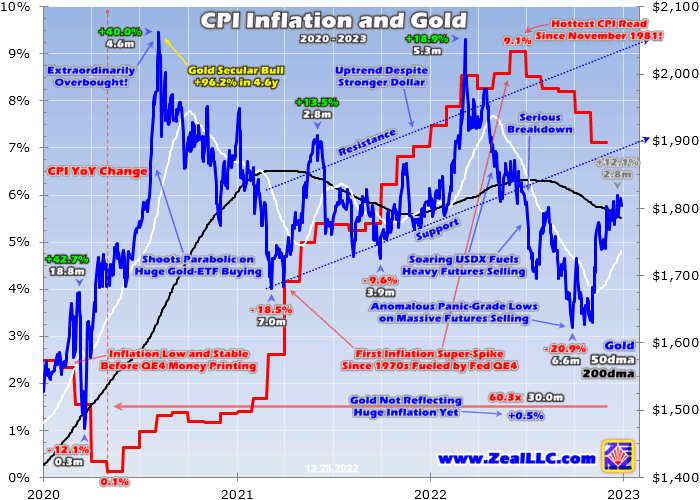
No bones about it, gold’s performance during this latest Fed-spawned inflation super-spike has been poor to dreadful. Though an extreme pandemic-lockdown distortion, the trough CPI came in May 2021 up a trivial 0.1% YoY. That month gold averaged $1,850 on close. Despite inflation soaring vertical since then, gold has only averaged $1,795 so far this month. That’s down 3.0% through this inflation super-spike!
But it gets worse, as without lockdowns the CPI trough would’ve likely hit in November 2020 up just 1.2% YoY. Gold averaged $1,868 then, making for a 3.9% loss since. That’s incredibly disappointing, contrary to all historical precedent. With the worst inflation raging since 1981 at the tail end of the previous super-spike, gold probably should’ve doubled by now. That would have made for $3,750ish monthly-average prices!
Gold reacting so powerfully to an inflation super-spike may sound crazy, but it’s actually conservative. In the entire modern monetary era since August 1971 when the US dollar was severed from its gold standard, there have only been three inflation super-spikes. Gold did far better than doubling during the first two back in the 1970s. Investors flocked to it as inflation ravaged stocks and eroded dollar purchasing power.
That’s certainly evident in this next real gold chart, comparing CPI-inflation-adjusted gold prices to the monthly headline CPI prints during that 1970s decade. Gold prices are rendered in constant November 2022 dollars per the latest CPI, making them comparable with today’s. But all the gold upleg gains and correction losses are noted in actual nominal terms. Gold was a moonshot in those last inflation super-spikes!
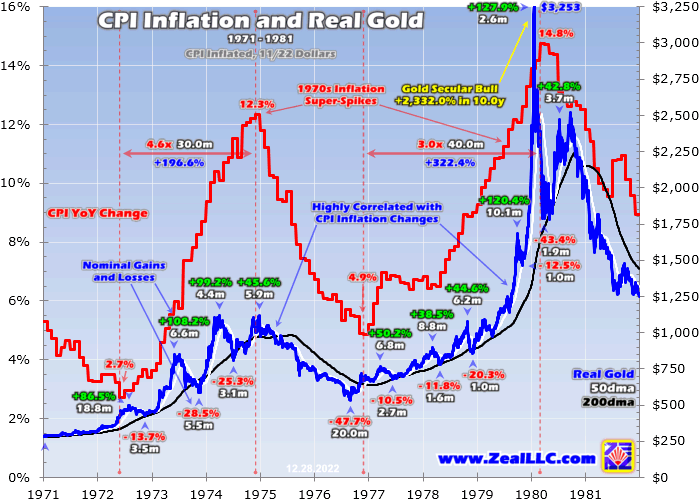
The first inflation super-spike ran between June 1972’s CPI trough up 2.7% YoY to December 1974’s peak soaring 12.3% higher. During that 30-month span, monthly-average gold prices from those trough to peak CPI months soared up 196.6%! Gold nearly tripled during that first inflation super-spike soon after the dollar gold standard was slain. Investors wisely used gold to protect their capital from inflation’s predations.
The second much-larger inflation super-spike erupted right on its heels, spawning at November 1976’s +4.9% YoY CPI trough. That ultimately peaked 40 months later in March 1980 with the CPI blasting up a soul-crushing 14.8% YoY. Monthly-average gold prices skyrocketed a colossal 322.4% higher during that span, literally more than quadrupling! Yet again raging inflation fueled massive investment demand for gold.
After effectively tripling and quadrupling during the only other inflation super-spikes seen in this modern monetary era, does it make sense for gold to languish flat to lower in this latest? Hell no! While gold’s gains this time around probably won’t be as huge with today’s far-larger aboveground gold supplies, a doubling isn’t a stretch at all. Despite way more gold, the growth in global fiat-currency supplies dwarfs that.
The best estimates I’ve seen for total aboveground gold stockpiles peg them near 75k metric tons back in 1970 and about 210k today. That’s up 180% in five-plus decades, around a 2% compound annual growth rate. During that same span the Fed’s broad M2 money-supply measure has shot stratospheric from $590b to $21,347b, up about 3,500%! That roughly 7.2% compound annual growth rate more than triples gold’s.
And that’s just US dollars. The Japanese yen, former pre-euro European national currencies, and the euro saw similar if not larger money-supply growth over this past half-century! So relative to the endless supplies of fiat currencies spewed into the world, gold is more precious today than during those last inflation super-spikes. Once investors really start worrying about inflation, there’s not much gold to go around.
So far inflation’s corrosive and devastating impacts on investment portfolios have been underestimated radically, but that will likely start changing in 2023. The Fed’s uber-hawkish jawboning and extreme rate hikes have convinced investors higher interest rates will kill inflation. But the Fed is peddling snake oil, the only way to stake this inflation super-spike is destroying the lion’s share of that vast QE4 money printing.
When even lowballed headline CPI inflation remains stubbornly high in 2023 despite 425 basis points of federal-funds-rate hikes in 9 months, investors’ faith in the Fed will be shaken. And several factors will increasingly contribute to higher general awareness of inflation’s ravages. These include ending artificial suppression of gasoline prices, a lower US dollar boosting import prices, and weaker corporate earnings.
Americans perceive inflation most in things we must buy often, led by gasoline and groceries. The latest November CPI subindexes for these surged 10.1% and 10.6% YoY. Gasoline prices would’ve been way worse without the Biden Administration’s unprecedented artificial suppression of prices ahead of 2022’s midterm elections. The wartime US Strategic Petroleum Reserve was ordered to release 180m barrels of oil!
That temporary supply flood forced crude-oil and gasoline prices much lower, considerably lessening Americans’ perceptions of inflation. But that political stunt drained roughly 40% of the SPR, leaving it at its lowest levels since the mid-1980s! Without that marginal supply, oil and gasoline prices are heading back higher. That will again ramp awareness and concern about this raging inflation among investors.
And as everyone feeding a family knows, food prices are soaring far faster than the watered-down CPI suggests. Americans’ grocery bills are probably up about 20% to 30% YoY, not just 10%. Some of that is evident in the wholesale Producer Price Index, which isn’t as politically-charged. Over this past year for example eggs, vegetables, turkey, and pasta prices have soared 244.1%, 80.6%, 37.6%, and 32.8% YoY!
2022’s exceedingly-strong US dollar on those extreme Fed rate hikes also really mitigated the impact of inflation. That higher purchasing power relative to other major currencies made the vast quantities of goods the US imports cheaper. But as the dollar weakens in 2023, import prices will rise proportionally. Those higher prices for a sizable fraction of overall US GDP will also boost perceptions of raging inflation.
But the dominant inflation concern for investors will be its increasingly-dire impact on stock markets. That is what will ignite massive gold investment demand for prudent portfolio diversification! Persistently-rising general price levels really erode corporate earnings. Companies are forced to pay more for their inputs, but can’t pass along all those higher costs to customers. They will eventually balk, risking lower revenues.
That pinches profits, a serious problem when stock markets are really overvalued. That’s certainly the case now, with the elite S&P 500 companies averaging trailing-twelve-month price-to-earnings ratios of 28.5x entering December. That’s still in formal bubble territory, which starts at 28x! And that’s despite the S&P 500 already being down 20.6% year-to-date. 2022’s young stock bear has only just awakened.
The US stock markets would still have to be cut in half to hit their historical fair value of 14x earnings! The longer this bear persists and the deeper it mauls stocks, the more investors will up their tiny portfolio allocations in counter-moving gold. Those remain effectively zero, as seen in the ratio between the value of the leading and dominant US gold exchange-traded funds and the S&P 500’s overall market capitalization.
According to the World Gold Council, exiting Q3’22 GLD and IAU accounted for 40% of all the gold held by all the world’s physically-backed ETFs. That totaled 1,359 metric tons entering December, which was worth $77b. Yet the elite S&P 500 stocks’ collective market cap then was $36,346b, implying American stock investors had gold portfolio allocations on the order of 0.2%. During an inflation super-spike no less!
If those climb to 1% or 2% or maybe even 5% in coming years, gold could easily double. Inflation slams stock markets, resulting higher interest rates crush bond prices, and cash’s purchasing power relentlessly erodes. Millennia of history have proven gold is the refuge of choice during inflationary debasements of currencies. Gold powers higher on balance on growing investment demand during such dangerous times.
Gold will start reflecting this raging inflation more in 2023 as the scales fall from investors’ eyes. They will see high inflation persisting despite 425 basis points of Fed rate hikes in 2022. They will realize higher rates aren’t the inflation panacea Fed officials claimed. With that blistering hiking cycle already 85% done relative to Fed officials’ terminal federal-funds-rate projections, they’ll know the Fed is running out of ammunition.
Investors’ inflation worries will really ratchet up as corporate earnings continue weakening, feeding this ravenous stock bear. Higher gasoline prices and a lower US dollar will exacerbate perceptions inflation is still raging out of control despite the Fed’s extreme rate hikes. As their stock-heavy portfolios burn with mounting losses, they’ll increasingly remember gold. Huge capital will be reallocated into this inflation hedge.
Soaring gold investment demand will drive much-higher gold prices. The biggest beneficiary will be gold-mining stocks. The leading GDX gold-stock ETF is already up 37.4% at best since late September, which amplified gold’s parallel 12.1% mean-reversion rally by 3.1x. And the smaller fundamentally-superior mid-tier and junior miners we specialize in well outperformed that. Their upside potential in coming years is huge!
Researching and trading the better mid-tier and junior gold stocks has been our specialty at Zeal for over two decades now. We aggressively added new trades at fire-sale prices in recent months surrounding gold’s bottoms, filling our newsletter trading books. Their unrealized gains are already running as high as +76.8% this week! All speculators and investors need gold-stock portfolio allocations given gold’s bullish outlook.
The bottom line is gold will increasingly reflect this latest inflation super-spike in 2023. Gold investment demand will return with a vengeance as 2022’s illusions are dispelled. As high inflation persists, investors will realize extreme Fed rate hikes are ineffective in slaying it. Confidence in the Fed will collapse as it runs out of room to keep hiking. Investors will increasingly worry inflation will rage much longer than they hoped.
That will ravage corporate earnings, hammering still-overvalued stock prices much lower. As this young bear deepens, investors will increasingly seek to diversify their burning stock-heavy portfolios. They will remember gold being the ultimate inflation hedge, and start shifting capital into it. With gold allocations now effectively zero, there’s vast buying coming which will fuel powerful bull runs in gold and its miners’ stocks.
Adam Hamilton, CPA
Legal Notice / Disclaimer
Ahead of the Herd newsletter, aheadoftheherd.com, hereafter known as AOTH.Please read the entire Disclaimer carefully before you use this website or read the newsletter. If you do not agree to all the AOTH/Richard Mills Disclaimer, do not access/read this website/newsletter/article, or any of its pages. By reading/using this AOTH/Richard Mills website/newsletter/article, and whether you actually read this Disclaimer, you are deemed to have accepted it.










